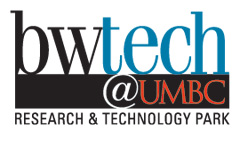bwtech@UMBC Helps Jump-Start Small Companies
It started back in 1989 – with two trailers and just five companies. By 2006, the bwtech@UMBCResearch and Technology Park was a major player – boasting 42 companies, bringing thousands of jobs to Maryland, and generating $100 million in income. Now, six years later, bwtech just topped 100 companies and is widely recognized as one of the top parks for nurturing small companies.
There are about 20 incubators in Maryland, but bwtech is one of only two working to grow the region’s cybersecurity industry. Twenty-four companies call the cyber incubator home, along with the CyberHive, a unique venture which provides a virtual incubator for companies outside the region and physical space for networking. The incubator’s contributions were recognized last year, when Ellen Hemmerly, president and executive director of bwtech, received the 2011 Innovator of the Year Award from The Daily Record.
“I’ve been involved in incubators for twenty years,” says Hemmerly, who has spent 15 of those years at bwtech. “In all my years of working with area incubators, the bwtech cyber incubator is the fastest growing and has much potential economic impact.” That, she says, is due in large part to its relationship to UMBC and to its partnerships with both the private and public sectors, such as Northrop Grumman and the Maryland Department of Economic Business Development.
But, it’s not all about cyber. For bwtech diversity is key. While cyber accounts for 40 percent of the companies at bwtech, the life sciences make up 40 percent and clean energy 10 percent. The remaining 10 percent are organizations dedicated to training and research.
There’s no question that the diversity of companies at bwtech contributes to the park’s success.
“With diverse companies developing innovative products and services in cybersecurity, clean energy and life sciences, bwtech@UMBC addresses the most compelling issues we face as a state and as a nation.” says Christian Johansson, Secretary of the Maryland Department of Business and Economic Development.
The defining characteristic that draws all the park’s activity together is a focus on nurturing early stage companies.
For example, the Life Sciences and Clean Energy Tech incubators host a monthly round table where 10 to 15 CEOs gather. Sometimes the research park will bring in an outside speaker, says David Fink, director of entrepreneurial services at bwtech. The bwtech park also supports entrepreneurs-in-residence, who help companies not only define their goals, but achieve them.
Kimberly Brown, CEO of Amethyst Technologies, values the opportunities to connect with other companies. Other CEOs, such as Eric Fiterman of Rogue Networks, say that having access to the entrepreneurs-in-residence is key to learning about business. “I’m just an average Joe,” says Fiterman, “I’ve never done this before.”
Kathleen Turano, President of Plant Sensory Systems agrees. “We were new to the business world,” says Turano, a former professor at Johns Hopkins University School of Medicine, “and the most attractive feature of bwtech@UMBC was the mentoring service.” That experience, she says, was invaluable. It also appears to have paid off. Turano’s company, Plant Sensory Systems, entered a collaboration this past October with DuPont Pioneer to evaluate proprietary genes for increasing the nitrogen use efficiency in corn.
Delali Dzirasa, CEO of the cybersecurity company Fearless Solutions, says Victor Hess, his entrepreneur-in-residence, tells him to focus. More than once, Hess has helped Dzirasa take a step back: “He’ll tell me that I’m kind of looking at too much.”
Companies like Brown’s, Turano’s, Fiterman’s and Dzirasa’s usually come into the incubator with a couple of people and stay for a few years. Then they “graduate” and become accelerator companies, moving into more long-term space at the park.
In its six years at bwtech, Amethyst Technologies has grown from two to 24 people, starting in the incubator and quickly moving to the accelerator. The company stays for the creative energy of the park and the financials, says Brown. “We get lab space at a below-market price.”
The company started with 400 square feet of office space; now it’s up to 4,000 square feet of office space and 1,000 square feet of wet lab space.
As companies grow, they can take advantage of partnerships with large, mature companies that work with bwtech, and sometimes call it home. Take for example, the Northrop Grumman Cync Program, a partnership between Northrop Grumman and the cyber incubator. The Cync Program, as it’s called, is designed to grow companies that commercialize cyber technology. The program, which has seven companies, provides rent-free space and cyber business expert support.
“One of the goals,” says Chris Valentino, director of cyber at Northrop Grumman, “is to help them build their brand.”
After all, nurturing small companies that will meet the product and service demands of the 21st century is what bwtech is all about.
(10/17/12)

